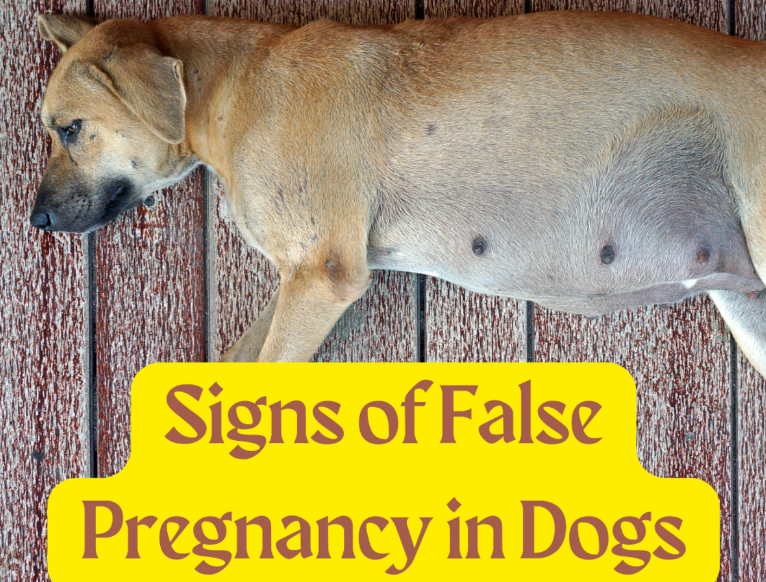Dog Pregnancy Symptoms include changes in appetite, nipple enlargement, and weight gain. During pregnancy, female dogs may experience various physical and behavioral changes that indicate their condition.
These symptoms can be observed in dogs around 4 weeks after breeding, and they may continue throughout the gestation period, which typically lasts for about 63 days. Recognizing these signs is essential for ensuring proper care and preparing for the arrival of puppies.
It is important to consult a veterinarian to confirm pregnancy and receive guidance on providing appropriate care for a pregnant dog. Understanding the symptoms of dog pregnancy can help owners ensure the health and well-being of their furry companions during this special time.

Signs Of Dog Pregnancy
Pregnancy in dogs, just like in humans, comes with a variety of signs and symptoms that indicate the presence of new life. Recognizing these signs is important for dog owners, as it allows them to provide the necessary care and support to their pregnant dogs. In this article, we will explore the different signs of dog pregnancy. We will discuss the physical changes and behavioral changes that dogs undergo during pregnancy.
Physical Changes
Dog pregnancy is accompanied by several physical changes that become noticeable as the pregnancy progresses. These changes are a result of hormonal fluctuations and the developing puppies inside the mother’s womb. Some common physical changes include:
- Swollen nipples: As the pregnancy advances, a dog’s nipples become more prominent and may appear swollen or enlarged. This is due to hormonal changes and increased blood flow to the mammary glands.
- Increased appetite: Pregnant dogs often experience an increased appetite, especially during the later stages of pregnancy. This is because their bodies require more energy to support the growing puppies.
- Weight gain: As the puppies develop, the mother dog naturally gains weight. However, it’s essential to monitor weight gain to ensure it is within a healthy range.
- Abdominal enlargement: As the pregnancy progresses, the dog’s abdomen will become noticeably larger. This is a result of the growing puppies and the expanding uterus.
- Vulvar swelling: In some cases, pregnant dogs may experience mild swelling of the vulva. This is a normal physiological response to hormonal changes.
Behavioral Changes
In addition to physical changes, pregnant dogs also undergo various behavioral changes during pregnancy. These changes are influenced by hormonal fluctuations and the dog’s instinct to prepare for motherhood. Some common behavioral changes include:
- Increased nesting behavior: Pregnant dogs may exhibit nesting behavior, where they will search for a comfortable place to give birth and begin preparing it by gathering blankets or toys.
- Increased affection: Many pregnant dogs become more affectionate and seek extra attention and cuddles from their owners. This is a result of hormonal changes and the dog’s instinct to seek comfort and security during pregnancy.
- Mood changes: Just like human pregnancies, mood swings can occur in pregnant dogs. They may display irritable or protective behavior, especially as they get closer to their due date.
- Decreased activity: As the pregnancy progresses, some dogs may become less active or show signs of fatigue. This is normal as their bodies are focusing more energy on supporting the growing puppies.

Physical Changes During Dog Pregnancy
During dog pregnancy, there are several physical changes that occur in your furry friend’s body. These changes are important indicators of their pregnancy and can help you prepare for the arrival of adorable puppies. Understanding these physical changes is essential for providing proper care and ensuring the well-being of your pregnant dog. In this article, we will explore three common physical changes that you may notice during your dog’s pregnancy: Enlarged Nipples, Weight Gain, and Swollen Abdomen.
Enlarged Nipples
One of the earliest physical changes you might observe in a pregnant dog is enlarged nipples. As your dog’s pregnancy progresses, her hormones cause her mammary glands to prepare for nursing the puppies. This preparation causes the nipples to become larger, more prominent, and sometimes darker in color. You may also notice tiny bumps or small secretions around the nipples. These changes usually occur within the first few weeks of pregnancy and serve as a clear sign that your dog is expecting.
Weight Gain
Another noticeable physical change during dog pregnancy is weight gain. As your dog’s body nurtures and grows the developing puppies, she will naturally gain weight. It’s important to note that the amount of weight gained can vary depending on several factors such as the number of puppies and the breed of the dog. However, on average, pregnant dogs tend to gain around 15-25% of their initial body weight. Monitoring and managing weight gain in pregnant dogs is crucial to maintaining their overall health and ensuring a successful pregnancy.
Swollen Abdomen
As the pregnancy progresses, you may observe your dog’s abdomen becoming swollen. This is a normal physical change that occurs due to the growing size of the puppies and the expanding uterus. The abdominal swelling usually becomes evident around the fifth week of pregnancy. It is important to note that while a swollen abdomen is a common symptom of dog pregnancy, it can also be a sign of other health issues, so it is recommended to consult with a veterinarian to confirm the pregnancy and rule out any complications.
Behavioral Changes During Dog Pregnancy
Just like humans, dogs also experience various behavioral changes during pregnancy. These changes in behavior are a result of hormonal imbalances and physical transformations taking place in their bodies. Understanding these changes can help you provide the necessary care and support to your pregnant dog. In this article, we’ll explore three significant behavioral changes during dog pregnancy: increased appetite, nesting behavior, and mood changes.
Increased Appetite
One prominent behavioral change you may notice in your pregnant dog is an increase in appetite. As her body works hard to nourish the growing puppies, she will require more energy and nutrients. Consequently, you may observe your dog becoming more eager and demanding when it comes to mealtime. It’s important to feed her a balanced diet rich in proteins and vitamins to support both her and her developing puppies.
Nesting Behavior
Another behavioral change that commonly occurs during dog pregnancy is nesting behavior. Your dog may start rearranging blankets, pillows, or other bedding materials to create a comfortable and safe space for giving birth. This instinctive behavior is her way of preparing for the arrival of her puppies. It’s essential to provide her with a suitable area where she can build her nest, ensuring it is quiet and free from disruptions.
Mood Changes
Mood swings and changes in temperament are also prevalent during dog pregnancy. Your normally friendly and calm dog may become more irritable or anxious due to hormonal fluctuations. Additionally, she may seek more attention and affection from you or prefer solitude. These mood changes are entirely normal and should be handled with patience and understanding. Creating a calm and stress-free environment will help your dog navigate through these emotional fluctuations.
Common Discomforts During Dog Pregnancy
During the course of dog pregnancy, it is common for dogs to experience certain discomforts. These discomforts can vary from dog to dog, but they often include morning sickness, loss of energy, and frequent urination. Understanding and recognizing these symptoms can help dog owners provide the necessary care and support to their pregnant dogs. In this article, we will explore these common discomforts in more detail.
Morning Sickness
One of the most common discomforts during dog pregnancy is morning sickness. Similar to human pregnancies, some dogs can experience queasiness and occasional vomiting during the early stages of pregnancy. This is often caused by hormonal changes in their bodies, and while it might be concerning for pet owners, it is generally considered normal. The symptoms of morning sickness typically subside after a few weeks. If the vomiting becomes severe or the dog shows signs of dehydration, it is important to consult with a veterinarian.
Loss Of Energy
Another common discomfort that pregnant dogs may experience is a loss of energy. As their bodies work hard to support the developing puppies, pregnant dogs may feel tired and lethargic. This is quite normal and expected during this stage. They may not be as active as usual and may prefer to rest or sleep more. Providing a comfortable and quiet space for your pregnant dog to rest is important to ensure her well-being. However, if you notice excessive weakness or if the dog seems excessively lethargic and unresponsive, it is recommended to consult a veterinarian.
Frequent Urination
Frequent urination is also a common discomfort during dog pregnancy. As the puppies develop and grow inside the uterus, they can put pressure on the bladder, causing pregnant dogs to need to urinate more frequently. This is a natural response to the changes occurring in their bodies. It is important to provide easy access to a designated bathroom area and take your dog out more often to prevent accidents inside the house. However, if you notice any signs of discomfort while urinating, blood in the urine, or if your dog is unable to urinate, it is essential to consult a veterinarian as these may be signs of a urinary tract infection or other complications.
When To Consult A Veterinarian
If you suspect that your dog might be pregnant, it’s crucial to pay close attention to any unusual symptoms that she may exhibit. While some pregnancy symptoms are considered normal, there are certain signs that may indicate a more serious condition. In such cases, it’s important to consult a veterinarian for proper diagnosis and treatment. Monitoring your dog’s health during pregnancy is essential to ensure the well-being of both the mother and her unborn puppies. Let’s take a look at some of the unusual symptoms that warrant immediate veterinary attention.
Unusual Symptoms
During dog pregnancy, it’s normal for your furry friend to experience some physical and behavioral changes. However, if you notice any of the following unusual symptoms, it’s vital to seek veterinary advice:
- Vomiting: Dogs may experience occasional sickness during pregnancy, but persistent vomiting or severe episodes can be a sign of a serious illness.
- Diarrhea: While mild digestive disturbances can occur due to hormonal changes, persistent or severe diarrhea should be addressed by a veterinarian.
- Lethargy: Pregnant dogs typically display decreased energy levels, but excessive lethargy or weakness could signal an underlying problem.
- Loss of Appetite: A decrease in appetite is expected during certain stages of pregnancy, but a complete loss of appetite can be a cause for concern.
If your dog exhibits any of these unusual symptoms, don’t delay in contacting your veterinarian. They will assess your dog’s condition and provide appropriate advice and treatment if necessary.
Difficulty Breathing
While some pregnant dogs may experience shortness of breath due to expansion of the uterus, severe difficulty breathing or labored breathing should never be ignored. This could indicate a significant problem that requires immediate veterinary attention.
Difficulty breathing during pregnancy may be caused by various factors, including cardiovascular issues or complications with the respiratory system. It’s important to have your dog evaluated by a veterinarian as soon as possible to prevent any potential harm to her and her puppies.
Remember, early intervention plays a crucial role in ensuring the health and well-being of your pregnant dog. By promptly consulting a veterinarian when you notice any unusual symptoms or difficulty breathing, you can best protect both your furry friend and her unborn puppies.
Frequently Asked Questions On Dog Pregnancy Symptoms
How Early Can I Tell If My Dog Is Pregnant?
You can usually tell if your dog is pregnant around 28 days after mating through a veterinarian exam or by observing signs like behavioral changes and physical symptoms like nipple enlargement. It’s best to consult with your vet for a more accurate confirmation.
How Do Dogs Act When They Are Pregnant?
During pregnancy, dogs may show behavioral changes such as decreased appetite, nesting behavior, and increased affection. They may also experience physical changes like weight gain, enlarged nipples, and swollen abdomen. It’s important to provide proper care and regular veterinary check-ups for a healthy pregnancy.
How Long Does It Take For Dogs To Show In Pregnancy?
Dogs typically show signs of pregnancy around 25-35 days after mating.
How Long After Mating Can A Dog Be Pregnant?
A dog can become pregnant immediately after mating, so there is no specific waiting period. Pregnancy can occur if the female dog is in heat and the male dog successfully mates with her. It is important to consider spaying or using contraception to prevent unwanted pregnancies.
Conclusion
To summarize, recognizing the signs of dog pregnancy is crucial for every dog owner. From changes in behavior to physical transformations, these symptoms can provide valuable insights into a dog’s reproductive health. By being aware of these indicators, you can ensure the well-being of your furry companion and prepare for the arrival of new puppies.
It’s always best to consult with a veterinarian for accurate diagnosis and guidance throughout the pregnancy journey. Stay vigilant and provide your pregnant dog with the care and support she needs.


